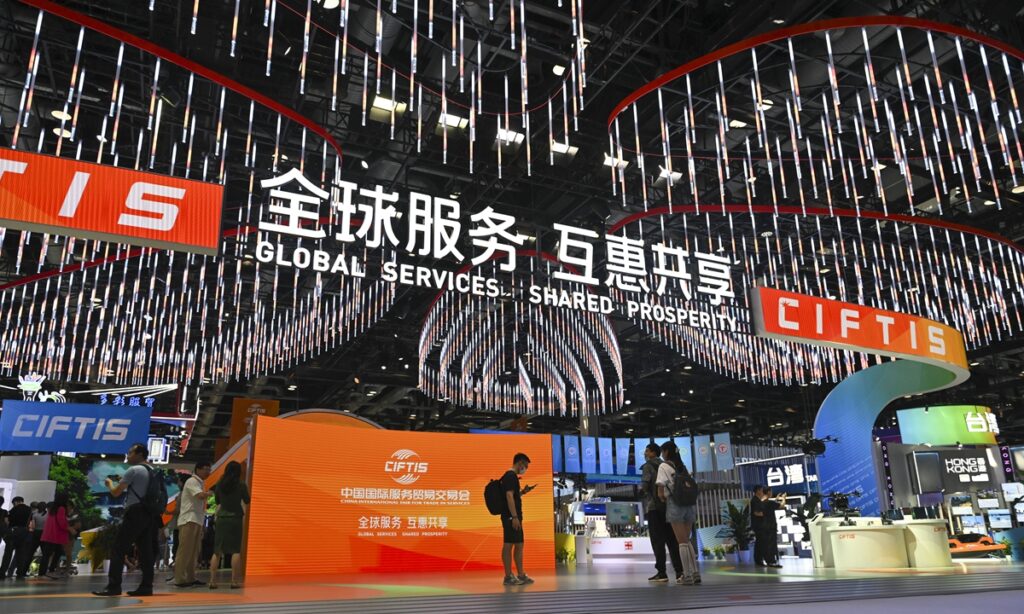There will be no “massive rewinding” of trade and investment internationalization, a senior Italian trade representative said at the 2023 China International Fair for Trade in Services (CIFTIS) over the weekend in Beijing, as Italian foreign minister kicks off a visit to China.
Italy sent one of the largest delegations to the 2023 CIFTIS in Beijing.
When asked to comment about the rhetoric of “decoupling” in the West, Gianpaolo Bruno, trade commissioner with Italian Trade Agency, told the Global Times in an exclusive interview on Saturday that he does not think it will “cause a massive change” that people read in newspapers. “Companies sometimes choose not to respond to geopolitical issues. They would like to engage in trade relations. They will not stop.”
“It is normal that the global value chain sees a little bit reshaping, considering the competitive advantages of countries,” said the Italian trade official, who oversees Italy’s trade affairs in China and Mongolia.
“There could be a slight, slow progress in internationalization process, given the fact that we have many problems in the world nowadays, but there won’t be a revolution with respect to the world that we have seen over the last decades that has seen China emerge as a great economic power for the benefit of everybody in the world,” Bruno said.
Italian Vice-President of the Council of Ministers, Foreign Minister Antonio Tajani’s three-day visit to China is scheduled from Sunday to Tuesday, and comes amidst Western media reportage that Italy is considering not to renew the Belt and Road cooperation agreement with China, and the visiting Italian foreign minister may discuss the issue with China.
During the visit, Antonio Tajani and Wang Yi, Member of the Political Bureau of the CPC Central Committee and Chinese Foreign Minister, will attend the 11th Joint Meeting of the China-Italy Government Committee.

Photo: Chu Daye/GT
“We count on China as a major market and a major economic counterpart. So we hope with this mission we can lay the ground for further development of our already brilliant relationship,” Bruno said, noting that next year marks the 20th anniversary of the establishment of the China-Italy comprehensive strategic partnership.
Declining to comment on the Belt and Road cooperation renewal, Bruno said he is sure that the [Italian] government will take care in the best possible way not to ruin the relationship with China. “There will be a balanced approach. And we hope that our governments will make the right decisions for the benefit of our peoples.”
The Italian trade official noted that the imbalance issue in bilateral trade, adding that there is need to create a basis for increasing market access for Italian goods to the Chinese market.
There was great potential between Italy and China in services trade, including digital services, culture, tourism, financial services, agricultural technology and healthcare, he noted.
For instance, bilateral cooperation in building China’s first cruise ship, which sourced large volumes of Italian hardware, underlined Italy’s strengths in certain industrial segments, according to Bruno.
“We have a whole range of possible segments to develop even further and which business communities on both sides could take advantage, including the opportunity given by the CIFTIS platform,” Bruno said.
Cui Hongjian, director of the Department of European Studies at the China Institute of International Studies, told the Global Times on Saturday that in the context of the gloomy global economic outlook, BRI cooperation will help stabilize the Italian economy and the country stands to lose many opportunities if Italy is blown off course by anti-China rhetoric and chooses to withdraw from Belt and Road cooperation.
Over the past five years, bilateral trade has increased by 42 percent, reaching nearly $80 billion last year, China’s Foreign Ministry said in August.
(Global Times)




